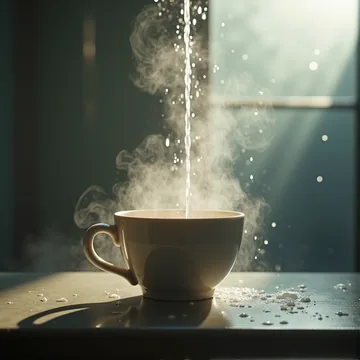TOP 7 Sobering Up Myths – Do Coffee, Showers & Energy Drinks Work?
Discover the top 7 myths about sobering up. Find out if coffee, cold showers, and energy drinks really work. Learn what truly helps you get back in shape.

Sobering Up – Facts and Myths Under the Scientific Microscope
Everyone knows that moment: the morning after a party, when your head is pounding and coffee seems like a savior. That's when the question arises – is there a way to really speed up the sobering process? The internet and friends' experiences are full of "proven" methods. But what does science say?
In this article, we debunk the 7 most popular myths about sobering up and explain why none of them work the way you think. Because in biology, there are no shortcuts – and your liver is a very patient, but slow, machine.
TOP 7 Sobering Up Myths – and What Science Says About Them
1. Coffee will get you on your feet
Caffeine can improve concentration and alleviate drowsiness, but it doesn't affect alcohol metabolism. ELI5: It's like opening your eyes wider – you see better, but you're not more sober. Your liver won't "speed up" just because you drink an espresso.
2. A cold shower will restore sobriety
Cold water stimulates circulation and gives a feeling of freshness, but it doesn't remove alcohol from the body. ELI5: It's like spraying a car with water – it looks better, but the engine inside is still running on fumes.
3. An energy drink will "reset" fatigue
This is one of the most misleading myths. Energy drinks contain caffeine and sugar that mask the symptoms of intoxication. You feel better, but you still have alcohol in your blood. ELI5: It's like covering a messy room with a curtain – you can't see the problem, but it's still there.
4. A walk will speed up alcohol metabolism
Physical activity improves circulation and well-being, but it doesn't change the work of liver enzymes. ELI5: The liver is like an oven with a set power – you can walk faster, but the oven won't burn more. Learn how long alcohol stays in your body in our detailed guide on alcohol metabolism.
5. Sleep is the best way to sober up
Sleep helps with regeneration, but it doesn't shorten the time it takes to break down alcohol. ELI5: It's like putting a computer in sleep mode – it doesn't speed up the processor, it just gives it a moment to rest.
6. A meal after drinking will "absorb" the alcohol
Eating can slow down alcohol absorption, but only if you eat before or during drinking. Afterwards, it doesn't matter – the alcohol is already in your bloodstream. ELI5: It's like closing the door after someone has left – it's too late for security.
7. Time can be "cheated" with home remedies
There's no magic trick that will speed up your liver. Alcohol is broken down at a rate of about 0.01–0.02% BAC per hour, regardless of gender, height, or coffee consumed. ELI5: It's like an hourglass – you can shake it, but the sand will still fall at its own pace.
Case study: 0.08% BAC in the body – how long does it really take to sober up?
Let's assume a person weighing 80 kg has reached a blood alcohol content of 0.08% BAC. Let's calculate how long it will take to become fully sober:
Step 1: Average alcohol elimination rate = 0.015%
BAC/h.
Step 2: 0.08 ÷ 0.015 = approx. 5 hours and
20 minutes.
Step 3: If the person drank more or has
a slower metabolism, the time can extend to 6–7 hours.
Conclusion: No shower, coffee, or walk will change this result. The only factor that speeds up sobering up is time – exactly the time your body needs to metabolize the alcohol. You can test it yourself using our BAC calculator.
3 Additional Facts to Remember
Fact 1: Every body reacts differently
The rate of alcohol metabolism is influenced by gender, body weight, liver health, and genetics. That's why you shouldn't compare yourself to your friends – their results can be completely different.
Fact 2: Feeling good doesn't mean you're sober
You might feel fine, yet still have a BAC over 0.05%. This is because the subjective feeling of "sobriety" appears sooner than the actual clearing of alcohol from your system. Read more in our guide on driving the morning after drinking.
Fact 3: A BAC calculator is science, not magic
Modern calculators use biological and mathematical models to estimate how long alcohol will remain in your system. It's the most accurate way to predict when you can feel safe.
Frequently Asked Questions
Does coffee really help you sober up?
No. It improves alertness but doesn't speed up alcohol metabolism. Sobering up only depends on time.
Does a cold shower do anything?
It refreshes and improves circulation, but it doesn't remove alcohol from the body. It's a myth.
What helps the most after drinking alcohol?
Time, sleep, and hydration. These are the only effective methods that support the body's regeneration.
How long does it take to burn off 0.10% BAC?
On average, 5–8 hours, depending on body weight and liver condition.
Very Important Information
This article is for educational purposes and does not replace a breathalyzer test. There is no way to speed up the sobering process other than the passage of time. All other methods are myths or provide a temporary feeling of well-being. Always use reliable tools before you get behind the wheel.
Trust science, not myths!
Instead of relying on home remedies, use our BAC calculator. It's a tool based on biology and mathematics that will show you how long your body really needs to sober up. Because facts are more important than myths.